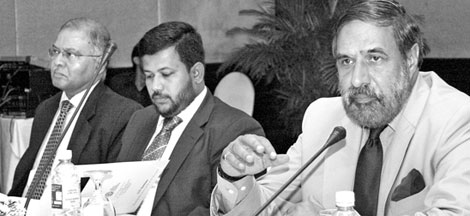India pledges preferential treatment for Lanka
''We are following the principle of asymmetry to which we are
committed so that there is special preferential treatment for Sri Lanka
without India seeking any reciprocity. I made this abundantly clear. And
it is now left to Sri Lankan and Indian businesses to take up this
opportunity and also to take it forward from here," the visiting Indian
Minister of Commerce, Industry and Textiles, Anand Sharma said.
He was speaking at the India-Sri Lanka CEOs forum in Colombo last
week.
 |
|
Indian Minister of Commerce, Industry
and Textiles, Anand Sharma addresses the India-Sri Lanka
CEOs forum |
The one-day forum was held to develop a road map for increased
cooperation and mutually beneficial economic partnership between the two
countries, and saw the participation of top business leaders from India
and Sri Lanka. Minister of Industry and Commerce Rishad Bathiudeen and
Senior Minister for International Monetary Co-operation Dr. Sarath
Amunugama and High Commissioner of India Ashok K. Kantha, were present.
At the forum, industry leaders and CEOs of both sides were in
agreement that Indo-Lanka trade could be doubled to $10b by 2105.
India's fifth largest dollar billionaire of Airtel fame, Sunil Bharti
Mittal and Chairman, DSI Group, Kulathunga Rajapakse co-chaired the
closed-door CEOs forum.
Mittal said, "Both sides concluded that we need to get to the point
where we can decisively up the game of investment and bilateral trade
between the two countries. With the Ministers' permission, I would like
to point out some of the issues that came up.
As for the issues asked by the Sri Lankan side, first is the
overarching fear of continuous trading balance though the trade volumes
under the FTA are fairly aligned around $ 500m".
"As TVS Motor Company Chairman and Managing Director, Venu Srinivasan
pointed out that a large part of the overall trade balance is due to the
petroleum products (bill) that costs in two ways - due to direct
petroleum imports and or getting it refined through India and importing
it. The real trade imbalance, therefore, is not large," he said.
"The Sri Lankan side said that when the trade volume moves up to
$10b, this trade gap will widen considerably, so India has to respond to
this concern. Secondly, on garments and textile exports to India from
Sri Lanka.
The quota allowed is too tight, according to Sri Lankan CEOs. I would
tend to agree that it's a very small number. As per concerns from the
Indian side, one is that the Indian business wants more flights and
better connectivity between India and Sri Lanka", he said.
"Some Indian businessmen want to come to Sri Lanka in the morning and
return to India on the same evening. But currently when one comes to
Colombo in the morning, there is no way to return to India in the
evening on the same day. The Indian CEOs call upon Sri Lanka to address
this matter of connectivity and improve it," Sunil Bharti said.
"Equally important is the issue of visas. Indians coming to Sri Lanka
on a business visa get only a one-month visa whereas Lankan businessmen
going to India get one-year multiple visas. I think that some attention
needs to be given to the visa issuance on both sides", he said.
"I would request the Industry and Commerce Minister to work with
Lanka's Foreign Ministry to ease the visa issue and make it more
liberal. Also the issue of India's restriction for worker visas, where a
minimum salary set at $ 25,000 per year, is causing some concern to the
Sri Lankan side," Sunil Bharti said.
"I agree that this amount is too high. It's very difficult for Sri
Lankan companies coming to India to get their skilled workers or
specialised workers for that salary level. A request is now being made
by India to set up an IIT or an IIM (technology and management training
institutes) in Sri Lanka. For that there is concern that current
legislation in Sri Lanka does not allow private universities or private
institutions," he said.
|

